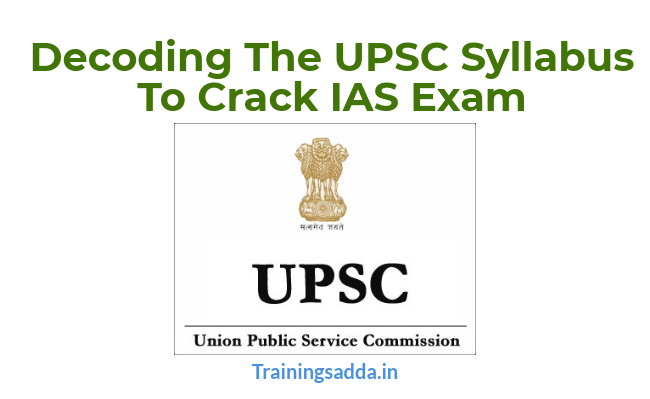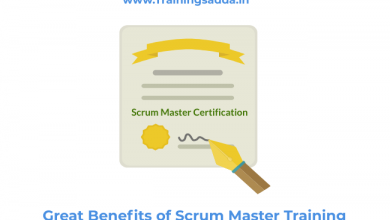Decoding The UPSC Syllabus To Crack IAS Exam
How To Break Down The UPSC Syllabus

Last Updated on May 16, 2019 by admin
Every year at least 10 lakh students register for the UPSC exam to get into Public services, but less than 10% of them come out successful. Serving the country as an IAS, IPS or IFS officer is a dream for many, but the journey to get there is tough and requires dedication and hard work.
The UPSC syllabus is extremely vast and hence students give themselves 12-15 months of preparation with undeterred focus. For this reason, candidates often feel under prepared or think they haven’t covered the entire syllabus. As an IAS aspirant, it is important that you must keep yourself updated with everything happening around you. This could be related to the Constitution, laws, political parties, national and state level policies among other things.
In this article, we will look at how to break down the UPSC syllabus so that students have a shot at clearing the IAS syllabus.
Table of Contents
How To Break Down The UPSC Syllabus
1. National policies
IAS aspirants must have a good understanding of the policies and must keep themselves updated with any policy that is doing the rounds in the newspaper or is in process. Social welfare schemes such as Swacch Bharat, Namami Ganga, and Jan Dhan Yojna are also extremely important. Here’s a list of policies of national importance that students should come prepared with:
- Election & model and code of conduct in India
- New India @75
- SDG India Index Baseline Report
- Health System for New India
- Move Summit Reports
- Three Year Action Agenda
- National Wind-Solar Hybrid Policy
- New Aviation Policy
- National Disaster Management Plan
- Hydrocarbon Vision 2030 for North-East
- Hydrocarbon Exploration and Licensing Policy
2. Bills & Rights
Having knowledge of the bills and rights of the country will help an IAS officer make decisions in his/her career. Students must make a list of all the noteworthy bills passed in the last 10-15 years and know them well. Here’s an indicative list:
- Triple Talaaq Bill
- The Fugitive Economic Offenders Bill 2018
- Model Agricultural Produce and Livestock Marketing (Promotion & Facilitation) Act, 2017
- Geospatial Information Regulation Bill
- Land Acquisition Act and Reforms
- GST Bill
- Muslim Women (Protection of Rights on Marriage) Bill, 2017
- National Water Framework Bill
- Real Estate Bill
- Enemy Property Amendment Bill 2016
- Carriage by Air (Amendment) Bill, 2015
- Juvenile Justice Act, 2015
- Anti-Hijacking Bill
- Compensatory Afforestation Fund Bill, 2015
- Mines and Minerals (Development and Regulation) Amendment Bill, 2015
- Regional Centre for Biotechnology Bill, 2016
- Rights of Transgender Persons Bill, 2015
- Model Shops and Establishments (Regulation of Employment and Conditions of Service) Bill, 2016
- Insolvency and Bankruptcy Code Bill 2016
- Sugar Cess (Amendment) Bill, 2015
3. The India Economy
Concepts like GDP, inflation, figures on unemployment and budgetary decisions that taken every year should be on the fingertips of every IAS aspirant. Starting from the Economic Liberalization in 1991, to the current economic scenario, students must understand its implications which effects the country to where it stands today and its relationship with the rest of the world. The following topics are some of the key concepts that are covered in the UPSC syllabus:
Read more: The CBSE Class 12th Result 2019 Analysis
- FAME I and FAME II
- Autonomy of RBI
- Employment Elasticity
- The future of crypto-financing in India
- Universal Basic Income
- India’s Infrastructure needs and the Smart Cities Mission
- Asia Africa Growth Corridor
- EPF Tax Issues
- Demonetisation
- Cashless Economy
- Economic Survey
- Union Budget
- Payment and Settlement Systems in India: Vision-2018
4. The Indian Geography & Environment
In terms of Indian Geography, students must be familiar with the major river systems and tributaries and how they affect the agriculture of the region, mountains, crops and the climate of every region. While covering the geography section of the UPSC syllabus, students must refer to the NCERT textbook and the atlas. Listed below are some of the key topics covered in Environmental Sciences and Geography:
Read more: Tips To Practice Mock Test To Clear Bank Exams in 2019
- Effectiveness of National Disaster Management Authority in India
- Cleaning of River Ganga: Programme and Achievement
- Green Climate Fund
- Effectiveness of NDMA in India
- National Green Tribunal of India
- Climate Change and Food Security
- GM Mustard Crop Approval and Other Issues
- Role of Governments in flood mitigation
- Indus Water Treaty and Analysis
- Cauvery Water Dispute and Analysis
- Labour Reforms in India
- Earth Interior and Earthquake
- Geological Time scale of Evolution
- The Himalayas in India
- Landforms
- Climate and Types of Climates
- Census 2011
- Different Indices related to Human Development
- Monsoon, ITCZ
- Forests in India
- Water Resources of India—River systems, Waterfalls
- Soils in India
- Climate Change and related Conferences Chronology — Paris Summit
- Major Disasters in the Year
5. The History of India
India is known for its rich culture and history because of the various civilizations and rulers that have shaped the country to how it looks today. In a diverse country like India, sometimes to understand ‘the why’ of something happening, one may have to dig deep and go back several centuries. An IAS officer may be posed with such dilemmas during their posting in unfamiliar territory. Hence it is important to know the history of the country, the rulers, the various religions, the wars that were fought among other things. Here’s a list of topics that are extremely important from the UPSC exam point of view:
- Indus Valley Civilisation- Harappan, Mohanjodaro
- Gautama Buddha, Buddhist Councils, and Principles of Buddhism
- Jainism, its principles and 24 Jain Tirthankars
- Temple Architectures
- Mauryan Rule overview
- Ashokan Inscriptions
- Gupta Rulers and its overview
- Foreign Visitors
- The accession of Qutub-ud-Din Aibak
- Sultanate Period
- Tughlaq Rulers
- Vijay Nagar Empire-Harihar and Bukka
- Mughals Rulers, Arts, Architecture and the major achievements of Mughal Rulers
- Akhbar and his religious philosophy- in Details
- Aurangzeb and his Policies
- Hyder Ali, Tipu Sultan and wars they fought
6. Modern History of India
As an IAS aspirant, students must be thorough with the following topics in modern history:
Read more: https://trainingsadda.in/top-5-countries-international-students-recruitment/
- 1857 Revolt and Associated Leaders
- Social Reforms in the Indian Society and related Acts
- Indian National Congress and its meetings
- India After the arrival of Mahatma Gandhi
- Life of Mahatma Gandhi and the Movements
- HSRA and associated leaders
- Bengal Partition and Delhi Darbar
- List of Governor General and Associated Works
- Muslim League
- Puna Pact
- Simon Commission
- Social Personalities
- Education Under British
7. Science & Technology
For IAS aspirants, it is important that they keep themselves updated with the technological advancements that India is working on, with regards to space and defense. Students must follow the newspaper every day to keep a track of the work that ISRO, DRDO is doing. In the previous year exams, there have been questions on PSLV Satellites, Agni missiles, Brahmos, Guided Missile System, etc. Here are some topics in science and technology that are important:

- Mission SHAKTI
- Zinc Deficiency and its effects( Linke between CO2 in Atmosphere and Zinc in crops)
- West Nile Virus
- Potassium Bromate
- Zika Virus
- IRNSS
- 3D Printing Technology
- Solar Cells
- GPS
- Blood
- Mineral important for Human Growth
8. International
Along with topics of national importance, IAS aspirants must keep themselves up to date with some of the key issues happening around the world along with India’s stance on them. Here’s a short list of noteworthy news items:
Find more: 5 Things To Know Before Take IELTS Test
- Umbrella Revolution in Hong Kong
- Srilankan Blast Details
- BRI – Belt and Road Initiative and India
- Veto Powers of the UNSC Permanent Members
- European Refugee Crisis
- Missile Technology Control Regime and India
- Brexit and its implications
- India and NSG Membership dynamics
- Nuclear Security Summit
- Convention on Supplementary Compensation for Nuclear Damage
- Supporting Syria and the Region Conference 2016
- International Solar Alliance
The key to succeeding in the IAS exam is concentrating in the current affairs section of the UPSC syllabus. The current affairs will include topics from all the above key points mentioned. As and when you complete a few topics, it is important that you look at some previous year question papers to see the types of questions asked and level of difficulty. While solving these papers, students will see that almost 50% of the questions asked in previous years do get asked again. Hence, practicing mock tests and solving previous year papers should be a key part of your IAS preparation, once you have finished covering the UPSC syllabus.
All the best!
Comments
0 comments




